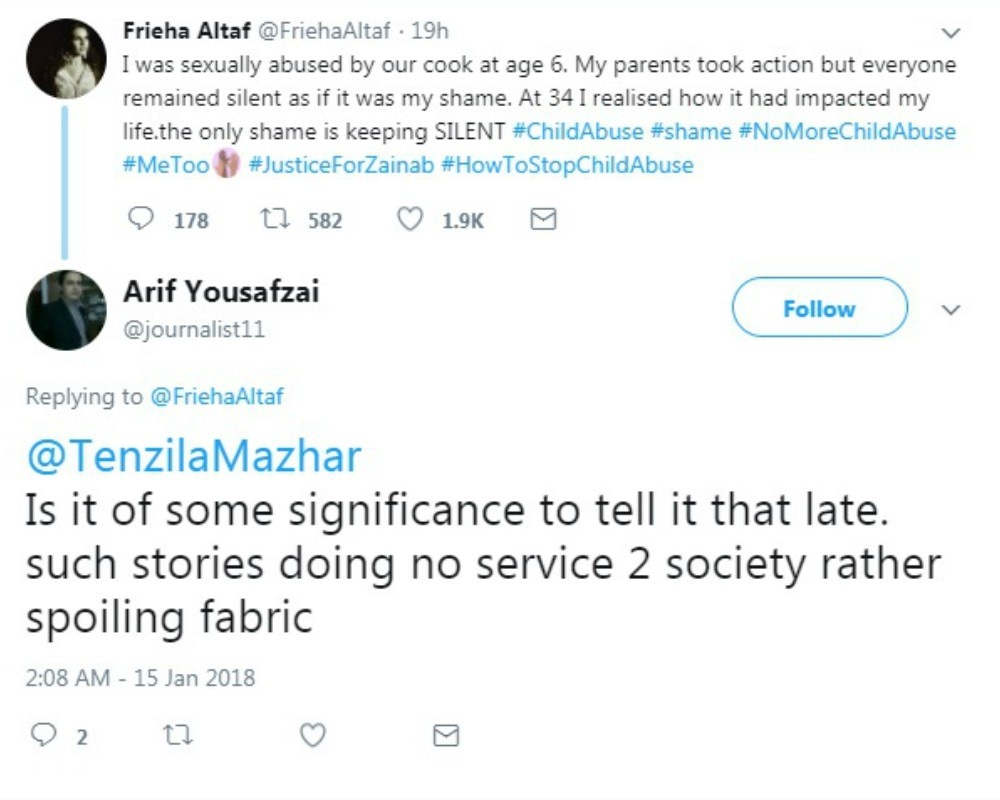How to respond when a sexual abuse survivor comes forward with their story

Almost every single woman you know has probably been the victim of sexual assault of some kind. Yes, it's a bleak thought but ask a woman to think back and she'll most likely have a story.
And many of these incidents can be traced back to their childhood.
It's an epidemic that is staring us in the face, in the wake of Zainab's rape and murder; child abuse is a rampant problem in our society, irrespective of class and gender, because men too are assaulted and abused.
Celebrities like actor Nadia Jamil, designer Maheen Khan and PR maven Frieha Altaf have opened up about their own experiences of sexual abuse. With so many people coming forward with their stories, it's important to react appropriately.
Read: The shame isn't ours, say Pakistani celebs as they share sexual abuse experiences
The Cosby allegations, the Weinstein abuse and so many others have had a global ripple effect; we are now quicker to hold people accountable for their actions, we are more likely to believe people when they say something bad happened to them but there is still more work to do — there always is.
Here's some things to consider whether it's someone who confides in you personally or it's a #MeToo tweet you spot on social media:
Don't: Ask them why they took so long to come forward
Every time a woman opens up about sexual abuse, people come out of the woodwork saying "why now?".

Think about what victims face when they come forward: public ridicule and scrutiny, attacks on their characters, having to relive trauma and the unlikelihood of justice. And now imagine the bravery it takes to come clean anyway.

When these stories date back years or even decades,why did the women not say anything until someone else did? The answer lies in the question itself; there is strength in numbers and often it takes one loud voice to pave the way for others to speak up.
Do: Believe them and support them
It sounds like such a small thing but it's truly a big deal: so many victims stay silent for as long as they do because they feel like no one will believe them.
Leave any “why” questions out of the conversation, your job is simply to support this person and the best thing you can do is make it clear to the victim that you are there for them and that yes, of course you trust their word.
Don't: Blame the victim
Victim-blaming may as well be our national sport if Twitter is any indication. Ironically, the ones who actively engage in shaming victims are also always the ones asking why the survivors stayed silent for as long as they did.
They imply that survivors are in some way responsible for what they went through — instead of, you know, their abusers or harassers who put them through it.
Don't distract from the conversation at hand. Modesty or lack thereof does not make someone less worthwhile and does not give permission to anyone to be assaulted.
Do: Choose your language carefully
We understand that it can be difficult to know what to say when someone reveals their suffering to you but language is important, it is crucial in indicating how you're extending your support.
US-based anti-sexual violence organization, RAINN (Rape, Abuse & Incest National Network) recommends you use phrases like “I’m sorry this happened/This shouldn’t have happened to you.” or “It’s not your fault/You didn’t do anything to deserve this.”
Steer clear of any statements that might make victims feel like you are judging them, trivializing their experience or express disbelief regarding the attacker, as often the perpetrators are people they've known in a personal capacity.
Don't: Say "not all men"
The long-standing power dynamics between men and women have put men in a superior position in society, more often allowing men a voice. When men avoid validating these stories and start shouting "not all men", that only perpetuates the systematic oppression of women.
And what's even worse is when women start using the same phrase Check your internalized misogyny and your privilege; the assertion that you have not faced such men in your life is not productive and only minimizes many hurtful female experiences.
The fact that “not all men are like this” does not change that a staggering number of men like this do exist and the worst time to talk about this is when women are coming forth with their ordeals; this is not the time to talk about how you're absolved of all responsibility, it's the time to become better allies.